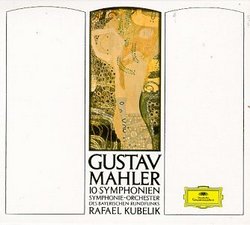| All Artists: Mahler, Kubelik, Brs Title: Symphonies 1-10 Members Wishing: 0 Total Copies: 0 Label: Polygram Records Release Date: 2/13/1990 Genre: Classical Styles: Historical Periods, Modern, 20th, & 21st Century, Symphonies Number of Discs: 10 SwapaCD Credits: 10 UPC: 028942904224 |
Search - Mahler, Kubelik, Brs :: Symphonies 1-10
 | Mahler, Kubelik, Brs Symphonies 1-10 Genre: Classical
While each performance faces stiff competition, Kubelík's late sixties/early seventies Mahler cycle, taken as a whole, remains the most consistent in the catalog. He is also one of the only Mahler conductors on record... more » |
Larger Image |
CD DetailsSynopsis
Amazon.com While each performance faces stiff competition, Kubelík's late sixties/early seventies Mahler cycle, taken as a whole, remains the most consistent in the catalog. He is also one of the only Mahler conductors on record to divide first and second violins left to right, as was the composer's practice. Newcomers wishing to acquire all the symphonies cheaply in one place won't be disappointed here. --Jed Distler Similar CDs
|
CD ReviewsYou can do a lot worse than this: Jonathan Stern | New York, New York USA | 06/29/2000 (5 out of 5 stars) "If you are looking for consistency - the Mahler symphonies as a box set, with one orchestra and one conductor - this DG release is an excellent choice. In my opinion, only Haitink's Concertgebouw cycle is better among the other complete cycles (sadly, this seems to have been deleted, though individual symphonies are still available). Kubelik conducts with flair and excitement, but without the hard-edged theatrics of Solti or the manic tamperings of Bernstein. He takes more interpretative risks than Maazel or Abbado, though he never overdoes things like Tennstedt. Also, he is equally at home with lyrical sections as well as in big climaxes and moments of raw energy. The BRSO plays with competence and enthusiasm; they blow away the NYP of the 60's and play with better tonal allure and blend than does the Chicago Symphony. The Concertgebouw may be more at home with the music on the whole, though the BRSO is most ingratiating. The most notable flaws occur in landler trios (4, 9, etc.), where the dotted rhythms can sound awkward. DG's sound is spacious and charmingly early 70'sish. As with all cycles, not every performance is "definitive." Haitink's RCO 5th is greater, Barbirolli's 6th is searing, and Levine's 9th is to die for. Nonetheless, there are no duds in the Kubelik set, and some of the performances are as good as any ever made:1 - This performance is good, but strange. The first movement is exciting but affectatious. Oddly, Kubelik takes the repeat here, but avoids the repeat in the Scherzo (he's the only one who does this!). The powerhouse Finale lifts the whole recording onto a higher plane.2 - The Rolls Royce of the set. Possibly the best ever of this work. Warm and monumental like Walter's but much more exciting. Only Kaplan is competetive.3 - In contrast, the weakest of the set. Kubelik seems less comfortable here, rushing the tempi in the first two movements and allowing less breathing room throughout. The BRSO is less impressive here than elsewhere. Not a bad performance, but Haitink, Hoernstein, and Levine are way ahead.4 - A fine reading for those who like it cool, minty, and bracing rather than warm and sentimental. In the Reiner mode, but less objective and detached.5 - Aside from a sluggish opening in the Scherzo and some strange tempi decisions in the Finale, an excellent Fifth.6 - Wonderful account, but FAST. Still, within the quick opening tempo, Kubelik coordinates the work well. The slow movement is one of the best ever, competitive with Baribriolli's aching rendition. The BRSO is great again, though the final brass chorale is poor.7 - Somewhat lightweight, particularly in the first movement. The second Nachtmusik is too fast. But the Finale is a gem, and the whole performance is played with enthusiasm and abandon. A likable reading, especially given the fact that a truly great recording of the Seventh has yet to be made.8 - Ranks with the Second as one of the best in the cycle. With the exception of a wonderfully hammy Fischer-Dieskau, the singers sing rather than scream. No one tries to outplay or outsing the person next to them (for comparison, try Solti's ear-splitting account). Similarly, Kubelik conducts with humility and power, conceiving the work almost flawlessly. One of the very best Eighths.9 - A good reading for those who prefer a more objective view. The first movement is particularly well-handled by Kubelik and company. The Rondo Burleske needs more life and the first half of the Finale is a little dry, though the final pages are quite moving.10 - A serviceable rendition. The dance-like sections have an agreeable lilt while the serene passages are fine, if not quite as richly played as in other performances. The trumpet is overbalanced on his high A in the big climax. Not a bad twenty-two minutes of music, though at this point, you should try Cooke's performance version of the complete work (or any of the others if you are a die-hard.)" One of the very finest mahler cycles 01/08/2001 (5 out of 5 stars) "Despite a perplexing lack of attention from the world of classical reviewing, Kubelik's Mahler cycle remains one of the finest and most consistent, as he allows the composer's fine works to speak for themselves, something they are more than capable of doing. The First has always been an aknowledged great performance, but there are delights to be heard throughout this set... The finale of the Second here is one of the most powerful performances ever commited to disc. The third movement of the Third is magical in its atmosphere unlike few others. The strings in the scherzo of the Fourth have an icy, distant, melancholy feel to them totally appropriate to this music. The Fifth remains my favorite performance of this piece, searing in its intensity-the bright sound only making this the more true. The remaining four symphonies are equally compelling, most notably the Seventh, a great performance, cohesively blending the three sections, and making total sense of the final movement for once. This is a set that finally should be placed alongside the other great interpretations." MmmmmmmMahler... Jonathan Stern | 12/04/1999 (4 out of 5 stars) "This is definitely the most underrated Mahler cycle that exists. People are so blinded by the sentimentality of Tennstedt, the glitz of Solti, and the flair of Bernstein that Kublik is simply forgotten. What a pity. Kubelik's performances are remarkably accurate to the score yet tremendously moving, letting the music speak for itself without the additional heart-tugs of Bernstein. And I could honestly say that Kubelik's First, Second, and Fifth are the best recordings of these works I've ever listened to, while his Fourth, Seventh and Eighth are very, very good. But *everything* is wonderfully interpreted. This is the only complete Mahler cylce I would recommend in its entirety. Besides, the price isn't so bad!"
|

 Track Listings (4) - Disc #1
Track Listings (4) - Disc #1


